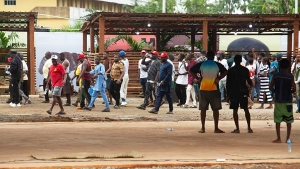Ethiopia: How Malaria Consortium Is Restoring Dignity for People With Lymphatic Filariasis in Ethiopia

Malaria Consortium has partnered with the National Podoconiosis Action Network (NaPAN) for a project awarded by the END Fund, under their Reaching the Last Mile Fund. The project, which is taking place in the Sidama region in Ethiopia and runs from May to November 2025, has been promoting a range of activities that tackle lymphatic filariasis — a neglected tropical disease that has a debilitating effect on the lives of many people across Africa.
Transmitted through the bite of infected mosquitoes, lymphatic filariasis manifests as severe swelling and deformity of the limbs and genitals (also known as lymphoedema). It’s estimated that over 657 million people across 39 countries worldwide are at risk of the condition.
Lymphatic filariasis can cause long-term disability and stigma that deeply impacts individuals, families and communities. It makes it difficult to move around, with severely limiting knock-on effects on daily life. Another symptom of the condition is hydroceles, a swelling in the scrotal region caused by fluid around the testicle. While there is no cure for the condition, pain and swelling can be managed to improve mobility, and hydroceles can be treated with surgery to drain fluid.
Malaria Consortium has long been involved in tackling lymphoedema: our Happy Feet project, led by the Health Development and Anti-malaria Association, is supporting people living with podoconiosis, a non-parasitic form of lymphoedema that is spread through overexposure to irritant red clay soils. The project provides similar outreach and care for people living with podoconiosis, which can cause comparable negative psychological and social effects in the form of isolation and reluctance to seek treatment due to fear of discrimination. The Happy Feet project aims to empower patients with podoconiosis to improve their own health, social bonds and economic wellbeing.
“Seeing stakeholders come together to support people living with lymphatic filariasis is truly inspiring,” says Esey Batisso Gabore, a project manager at Malaria Consortium Ethiopia. “Through training health workers, raising awareness and providing life-changing surgeries, we are restoring dignity, hope and opportunities for people living with this condition.”
Working with local health authorities and hospitals, this new project entails:
organising advocacy workshops
training health workers on how to provide care to people with lymphoedema
facilitating surgeries that remove hydroceles
facilitating community meetings to raise awareness
The overarching goal is to improve care for people affected by the condition and to reduce the stigma around it.
Raising awareness and reducing stigma
Creating awareness is key to reducing stigma and ensuring communities know where to seek care. Posters on how to manage lymphatic filariasis have been distributed for display in health posts and public gathering places in support of this goal.
An advocacy workshop was also held, which included representatives from the Sidama Region Health Bureau, zonal health departments, district health offices, and hospitals and health centres. The event was broadcast by the Sidama Broadcasting Corporation, extending its reach across the region.
Strengthening the capacity of health workers do their job
Improving the knowledge and skills of health workers is an essential part of tackling the burden of lymphatic filariasis. Through training, healthcare workers were briefed on lymphoedema morbidity management and post-hydrocele surgery care was delivered to almost 40 health professionals drawn from health centres, hospitals and government offices. They learned how to identify cases, provide practical care and support patients’ mental wellbeing. A two-day training session was also provided to health extension workers on case identification, community mobilisation and psychosocial support. They received simple tools, such as homecare lymphoedema management supervision checklists and patient reporting forms, to make their day-to-day work easier and more effective.
Malaria Consortium signed agreements with two hospitals to provide surgery for treating hydroceles. To date, sixteen patients have undergone successful hydrocele operations, and the project aims to complete 40 surgeries by the end of its implementation period.
The path forward
The project has made significant progress in raising awareness, training health workers and beginning to provide vital surgical interventions. Over the coming months, Malaria Consortium and partners will continue to strengthen local capacity and expand access to care, ensuring that people living with lymphatic filariasis in the Sidama region are better supported to manage their condition and live with dignity.
By Allafrica



